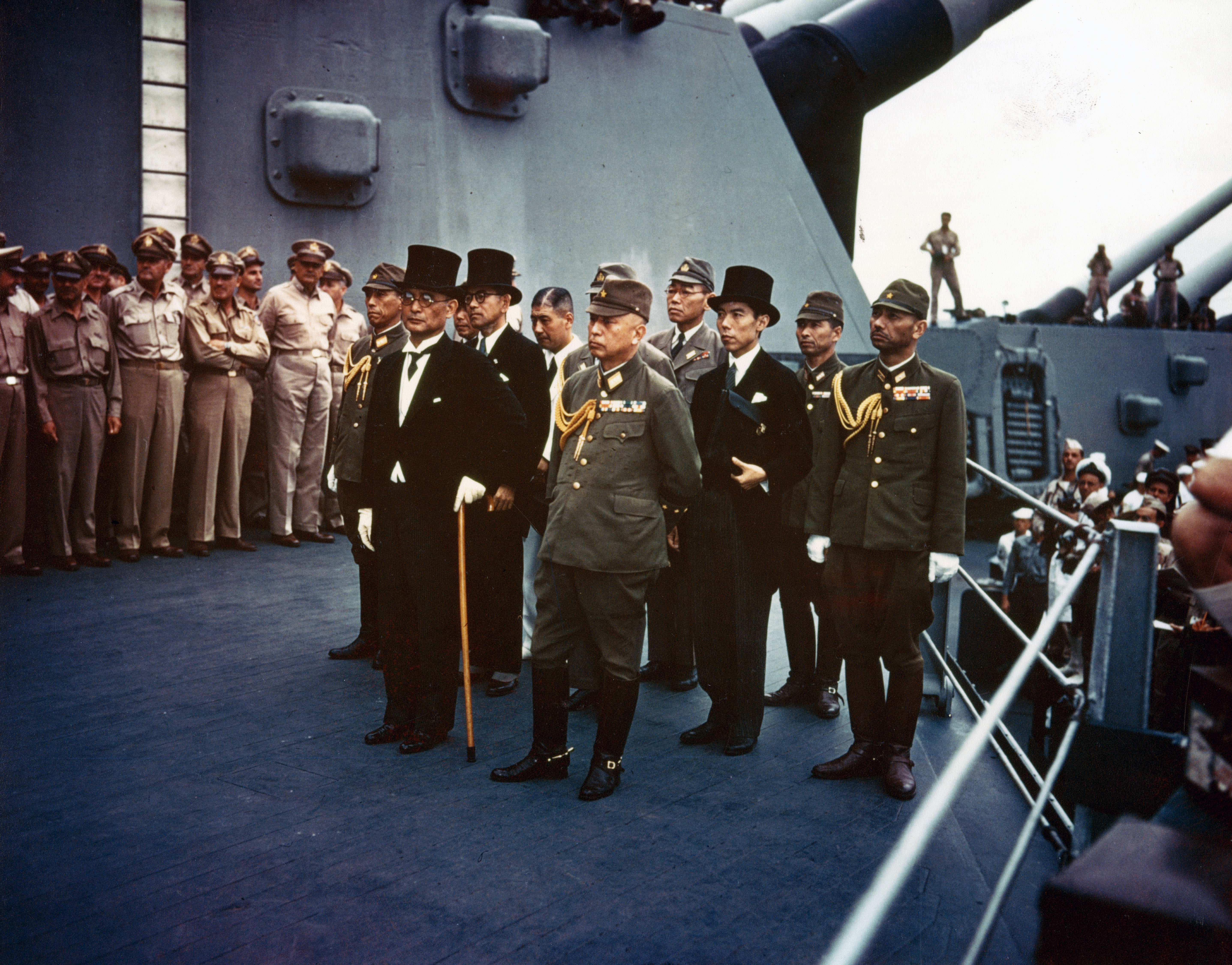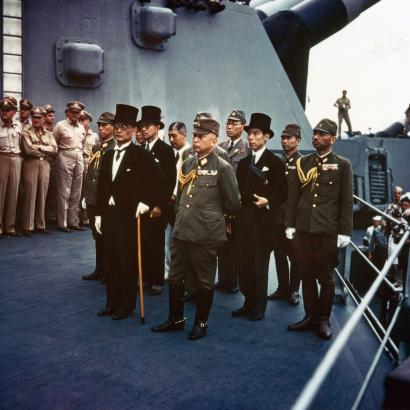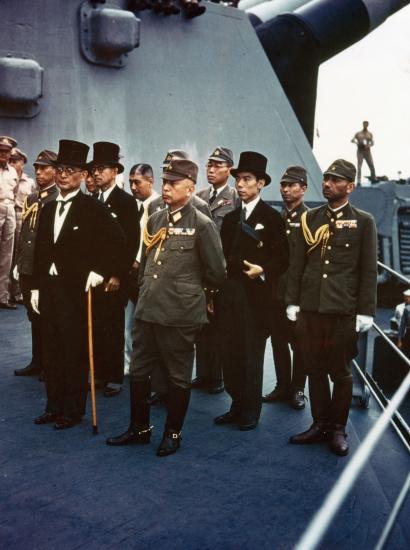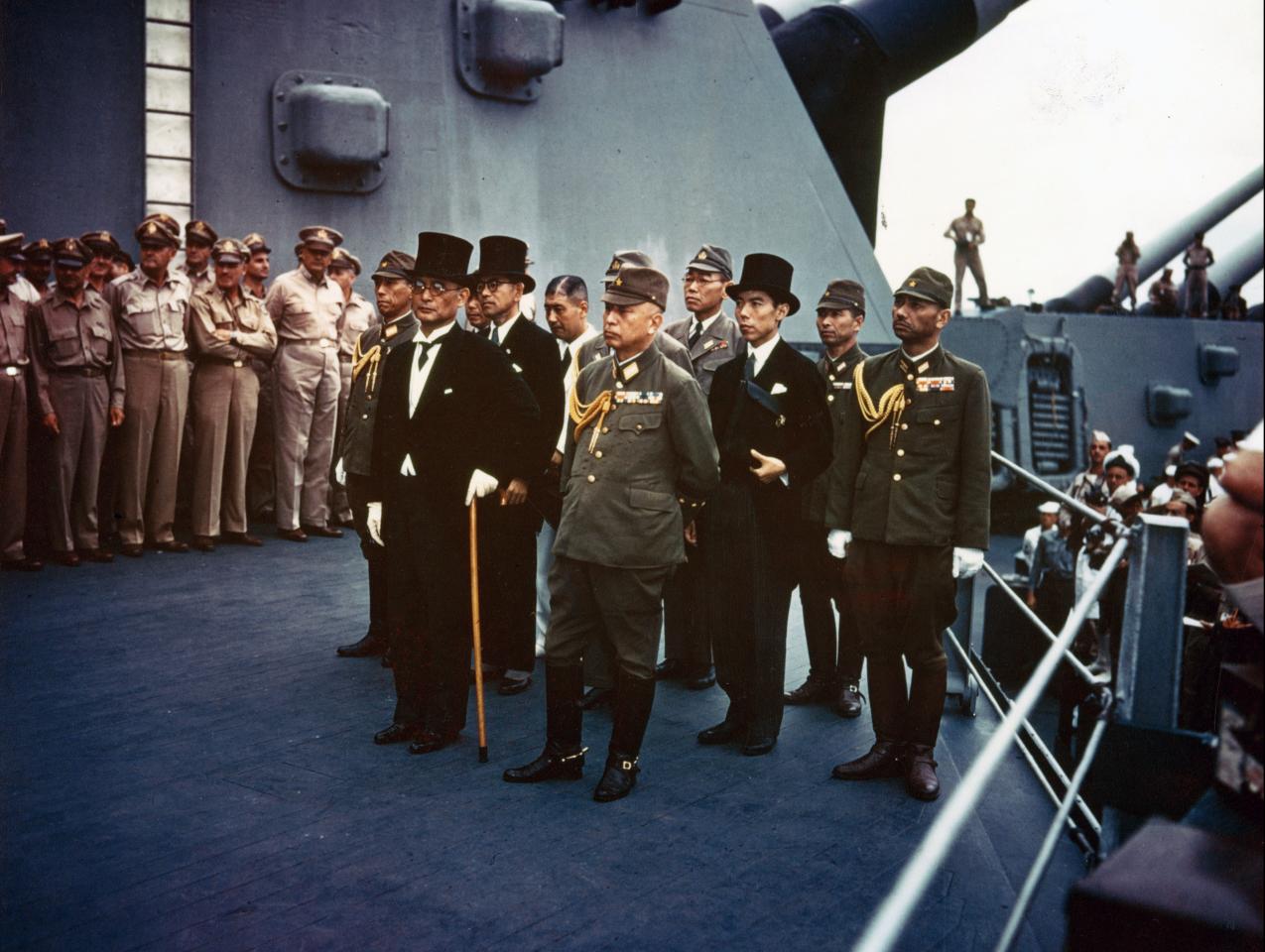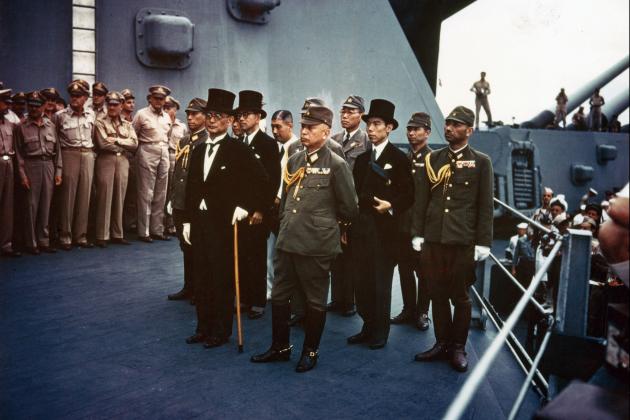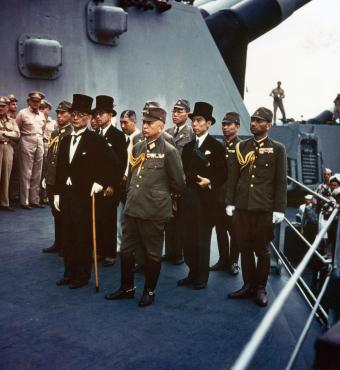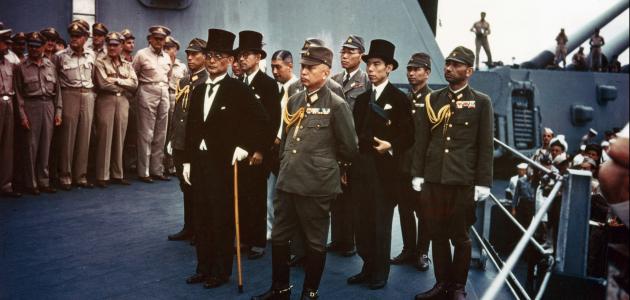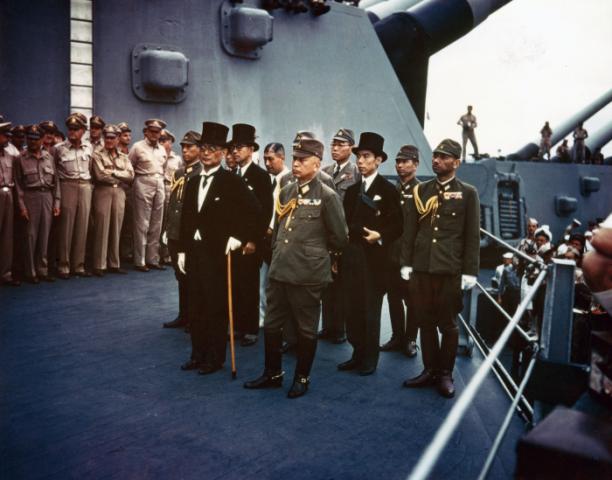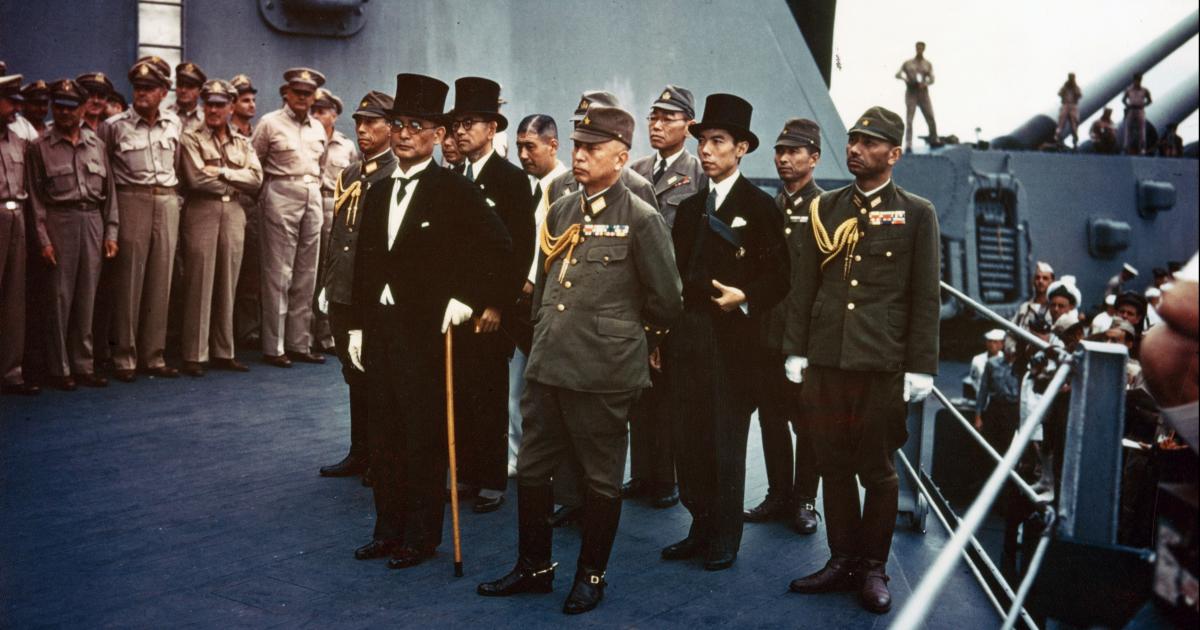In this excerpt from Uncommon Knowledge with Peter Robinson, historians Jonathan Horn and Ian W. Toll close the curtains on the Pacific theater of World War II, which ended eighty years ago with two blinding explosions and the surrender of Imperial Japan. Watch the full interview here.
Peter Robinson: Eighty years ago this summer, the war in the Pacific—the war that had raged from Pearl Harbor to the Philippines to Hiroshima—finally came to an end. When I was a little kid watching Second World War shows on television, that war in which my own father participated in the Pacific seemed somehow alive, current. I read your two books and in the passage of these decades, it seems closer now to the Civil War in my mind. The amount of personal initiative, the way training and some sense of honor is enough to force men to knowingly risk death and mayhem, is just astonishing, is it not?
Ian W. Toll: It’s an extraordinary chapter in our history and in world history. It’s the largest, bloodiest, most historically important war in our history. So, yes, absolutely, I think there’s a sense that we share as Americans that this was when we were at our best, and that’s been a very important part of the way the war is remembered.
It’s partly why we still find it so fascinating. I think maybe we have a sense that we were better as a country then than we are now.
Peter Robinson: Let’s focus on the final phases. On the night of March 9 and 10, 1945, taking off from the Marianas, some three hundred B-29s released more than 1,600 tons of bombs on Tokyo, including napalm. Destroying some sixteen square miles of the city, much of which, of course, was constructed of wooden structures, and killing as many as 100,000 people, mostly civilians. Now, by March 1945, the Germans had repeatedly bombed London; the British and we Americans had bombed Dresden. By this point in the war, are we simply inured to attacks on civilians, or is there a military justification for those firebombings?
Ian W. Toll: Well, prior to the war, our government and our military had been emphatic that air power should not be used to hit civilian targets. They had taken a very strong stand on the ethics and the morality of bombing civilian targets. As you said, the Germans bombed the hell out of British cities during the Blitz, arousing a very understandable feeling among the British people that they wanted retribution. When we got into the war against Germany, we were trying to destroy their war machine by hitting plants. But you go from trying to hit precision factories, bridges, and railheads to the next step: let’s hit the worker housing around the plants in order to “dehouse” them; that was the term. From there you take the step of “let’s just start bombing these cities.” And then you take the final step, which I know we’re anticipating here, which is, if you have one bomb that can do the job that you’ve already been doing with these incendiaries, why not just do it with one bomb?
You would not have gone from zero to four [immediately]. It had to be a step-by-step kind of thing. And this is in the context of a tremendous war, a brutal war, in which atrocities are being committed amid a sense by 1945 that we needed to end this thing as quickly as possible.
Jonathan Horn: There also are costs to not taking these measures as well. These things aren’t happening in a vacuum. People all across Asia are suffering at the hands of the Japanese, who are carrying out massacres and atrocities wherever they have gone.
There was no option on the table that wasn’t going to include huge amounts of casualties. There would have been American casualties if we had invaded. There would have been Japanese civilians. Churchill, I think, puts it best in his history of World War II where he says there really wasn’t a decision to make about the atomic bomb. It was always going to be used, if it could be used. And it would have been a massive scandal if we had had a weapon like that and we hadn’t used it.
Peter Robinson: Let me return to that. So, on August 6, 1945, the United States drops an atomic bomb on Hiroshima, and 70,000 to 80,000 are killed instantly. By the end of the year, radiation sickness raises the toll to about 100,000. Note, by the way, that 100,000 had already died in two nights of firebombing in Tokyo. On August 9, the United States drops an atomic bomb on Nagasaki, where some 40,000 die instantly. By the end of the year, the death toll rises to 70,000.
And at noon on August 15, in the broadcast that permits his subjects to hear his voice for the first time, Emperor Hirohito announces that Japan has surrendered.
Every American has to think this through, and I’m fascinated to hear what professional historians make of it. Two quotations: the first from the British philosopher Elizabeth Anscombe. She’s writing a 1958 pamphlet opposing Oxford University’s decision to award Harry Truman an honorary degree. She won’t have it.
With Hiroshima and Nagasaki we are not confronted with a borderline case. In the bombing of these cities it was certainly decided to kill the innocent as a means to an end. . . . I have long been puzzled by the common cant about President Truman’s courage in making this decision. . . . Mr. Truman was brave because, and only because, what he did was so bad.
Here’s the second quotation, by Wilson Miscamble, who, by the way, is both a historian of the early nuclear age and a Catholic priest.
The atomic bombs allowed the emperor and the “peace faction” in the Japanese government to negotiate an end to the war. Of course, the United States eventually could have defeated Japan without the atomic bomb, but all the viable alternative scenarios to secure victory . . . would have meant significantly greater Allied casualties and higher Japanese civilian and casualties. Arguing that dropping the bombs was the least harmful option to [Truman] will hardly be persuasive to those who see everything in a sharp black-and-white focus. Yet this is how I see it. If someone can present to me a viable and more “moral way” to have defeated the Japanese and ended World War II, I will change my position.
Ian, what do you make of Elizabeth Anscombe and Father Miscamble?
Ian W. Toll: We’ll be debating the morality of the atomic bombings forever. This is one of the most closely scrutinized issues of World War II. We now have had four or five generations of scholars doing the pick-and-shovel archival work. We understand very clearly what happened. And the answer as to the whether it was the right decision or not is not going to be found there.
There have been revisionist historians—I don’t particularly like that term—but there were various theories developed in the ’60s and ’70s, among them that the real purpose of bombing Hiroshima was to intimidate the Soviets. This “atomic diplomacy” concept has not fared well in more recent scholarship, although it is clear that Jimmy Burns, the secretary of state, and Henry Stimson, the secretary of war, had at various times said that this is a potential benefit of the atomic bomb: that it will be easier to deal with Stalin.
It is not true that the Japanese government was looking for a way to surrender, but it is true that there was a peace party.
Peter Robinson: Take a moment on that one.
Ian W. Toll: This is where the story gets unavoidably complicated. There was a peace party that wanted to bring the Soviet government in to mediate talks with the United States, looking toward a sort of negotiated surrender. Stalin is stringing them along in a devious way, characteristically, with the intention of attacking Japanese forces in Manchuria as soon as he could move his army into position in Siberia to do that. He had promised us at Yalta that he would join the Pacific War within three months of the fall of Germany. Our government, meanwhile, has broken the Japanese diplomatic codes, so we have a window into what’s happening in Tokyo. We know they’re urgently trying to bring in Moscow as a mediator.
So, we know that there is a part of the Japanese government that wants to end the war and may be willing to accept surrender on terms close to those we would find acceptable. But the military leaders were determined to fight to the end and would have prevented any move toward surrender.
The atomic bombings and Russia coming into the war, which happened the same day we dropped the second bomb on Nagasaki, provided the kind of shock that allowed for the final process where these two deadlocked sides of the ruling circle went to the emperor and said, we need you to decide. And he said, we’re going to surrender.
Peter Robinson: It is absolutely astonishing that the war cabinet in Japan, after two atomic weapons and the Russian entry into Manchuria, is still deadlocked. There’s a peace faction, but there’s also a faction willing to see Japan reduced to cinders.
Jonathan Horn: Even this discussion, of course, is a form of revisionism, because it wasn’t a discussion that was necessarily being had in real time in 1945. That is, if you’re looking at the options: if you’re starving Japan, it would surely have resulted in more civilian deaths. Invasion, something very much in the mind of American policymakers . . . how many Americans would die invading the main islands of Japan? The estimates were all over the place, but one thing was agreed: they were not low. It was going to be a high number, and a large number of Japanese civilians would have died.
Peter Robinson: If you read Elizabeth Anscombe, she believes that Harry Truman made a decision and that there’s a kind of calculus that was weighed and he chose the wrong and evil, but that isn’t the way it happened. The peculiar thing is that after the war, Harry Truman did take responsibility and said he had made the decision. The notion that the use of atomic weapons is reserved to the commander in chief is only codified after the war. There was no need for the president to make a decision, because everybody understood that any weapon we made that would help us win the war more quickly would be used.
Ian W. Toll: There are a few interesting wrinkles to this story. In his diary, Truman wrote the day he gave this order [paraphrased]: “I’ve told Stimson that we’re going to warn the Japanese and that we are not going to use this weapon against civilian targets. It’s going to be a military target.” This extraordinary passage is sitting there. I think historians have seen that as a sort of a ham-fisted effort to shape the perceptions of historians and biographers, knowing that they’d be reading the president’s diary.
But this is not what was ordered. What was ordered was to drop two bombs on two of the four cities that have been selected by the target committee as of a certain date. That order was put in writing in Washington and it was carried out. So, what’s Truman doing there? Is it just an effort to shape the way historians . . . obviously that wasn’t going to work. Or did it show that he had real pangs of conscience, and that maybe if he had been president for a year, if he had found his footing, was more confident, he would have given that order [to spare civilian targets], and then history might have played out differently?
Jonathan Horn: Can you imagine the scandal if Americans had carried out the invasion of the main islands of Japan, and it had gone anywhere close to how we think it might have gone? Huge numbers of casualties. And then the American people had discovered he had an atomic bomb? In the 1945 calculus, it would have been the largest scandal in the history of the United States.
Peter Robinson: Edward Teller, who spent his final years at the Hoover Institution and worked on the Manhattan Project, told me to my face that what he wanted to do—what he told everybody at the Manhattan Project we should do—was drop an atmospheric demonstration over Japan.
Jonathan Horn: It was thought that it would not be effective; it would not send the right message to the Japanese.
Ian W. Toll: It’s a very tangled story. You will see Stimson at various times saying we should demonstrate the bomb. You’ll see Truman agreeing with these suggestions. There’s a lot happening at the same time around the world. The war is ending, the postwar order is being born.
Peter Robinson: I think they didn’t quite know what the bomb was.
Jonathan Horn: Americans become too comfortable with looking back and saying they would have done things differently. But it’s also important to say that we are denying, in some sense, the agency of the Japanese themselves. They were the ones who were keeping this war going. They were the ones who had started this aggression and territorial expansion that led to the war. They were the ones who attacked Pearl Harbor, and they were the ones who had this philosophy of “no surrender” and that led to this terrible point—which we can all agree is terrible—that this became necessary to do in 1945.
This interview was edited for length and clarity.







